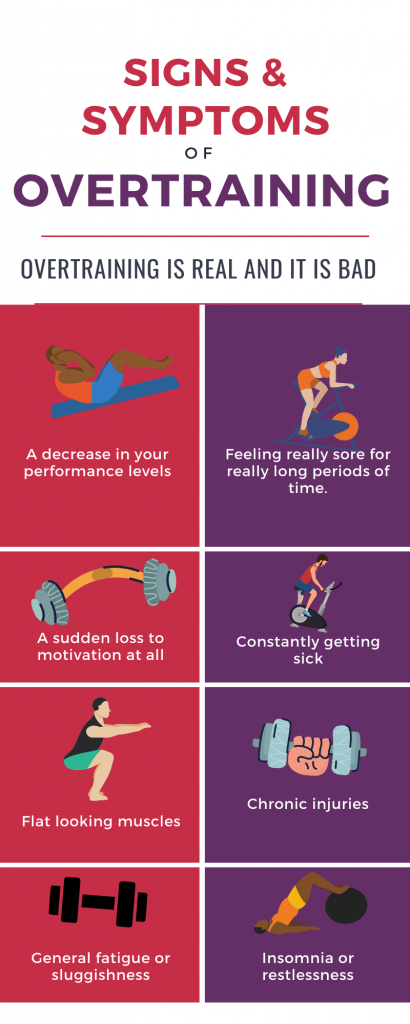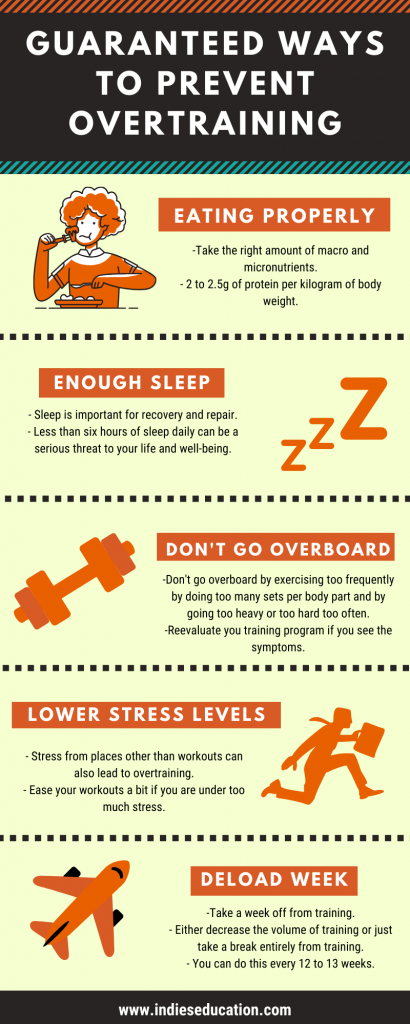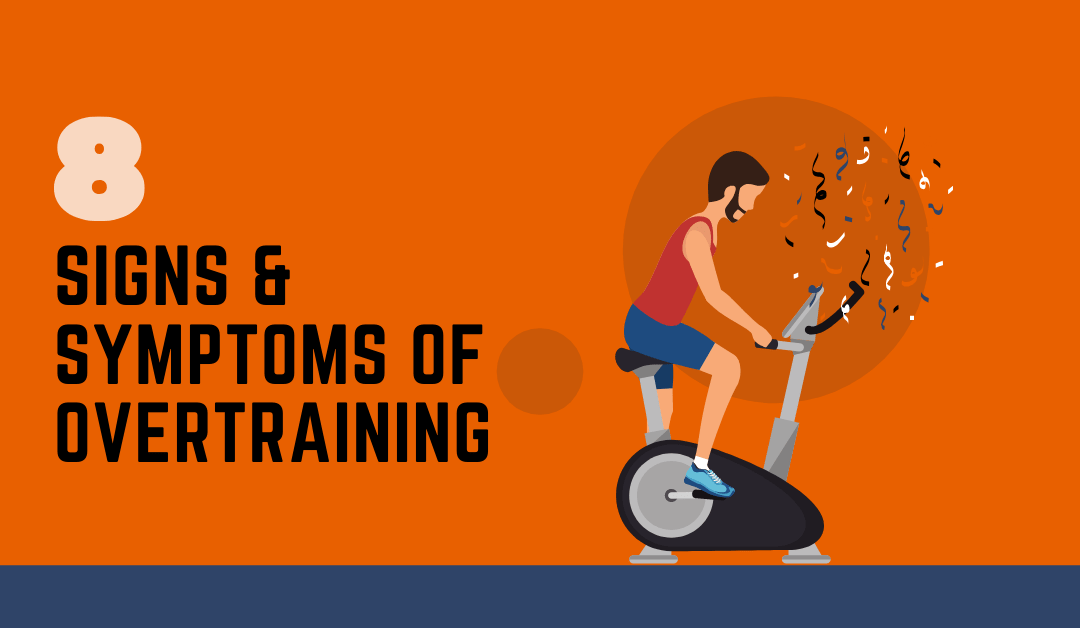Some people don’t believe that overtraining is real but scientific research tells a different story. Overtraining is real and it is bad. Your recovery can be seriously hampered if you overtrain. I’ll tell you about the signs and symptoms of overtraining and how to get rid of the consequences of overtraining.
Sometimes it would be obvious for you that you’re overtraining. If you are having a torn muscle but sometimes you may even not know that you’re overtraining.
The fact of the matter is you need to push yourself in the gym to see the results. Because undertraining is real as well even more common than overtraining.
When you don’t push yourself enough while working out and you don’t progressively overload with a higher training volume over time the level of stress you are putting on your body is just not enough.
The sweet spot for seeing results is just between undertraining and overtraining. However, if you cross that line you might be working harder than ever.
But instead of seeing results improvements, you’ll be slowing down your progress, causing overuse injuries creating hormonal imbalances.
If you continue overtraining for too long you can gain body fat and lose muscle mass. Long story short overtraining is just not caused by working out too much.
Instead, it’s the combination of putting too much physical, psychological and environmental stress on your body. Further leading to problems that you definitely want to avoid.
I am going to show you 8 signs that you need to look out for to ensure you’re not overtraining. I’ll also give you 5 ways to guarantee that you never overtrain again.
What’s in it for you:
How to know that you are overtraining?

There are some signs and symptoms of overtraining but if you don’t know them you may not even notice them.
- A decrease in your performance levels
If you’re working out really hard and your workouts typically go well but then you have one or two bad days where you feel weaker and tired during the workout that’s pretty normal and it’s probably not safe to assume that you’ve hit the point of overtraining.
On the other hand, if you consistently try to complete intense workouts to see some progress but instead you’re losing strength endurance or you repeatedly failing to complete your workout you might be crossing the line.
If you are overtraining and it’s resulting in decreasing performance you’ll experience things like noticeable changes in your grip strength.
The weights will feel heavier on your joints and your bones, you’ll have less stability and precision with movement patterns and a decrease in explosiveness.
If you consistently feel these symptoms during your workout you might see better results by backing off than working harder.
It may seem counterintuitive that rest will help you make progress but the best athletes and bodybuilders all know that training smarter will get you better results than training harder. - Feeling really sore for really long periods of time.
Another sign that you’ll experience is feeling really sore for really long lengths of time after your workouts. This is not to be confused with delayed onset muscle soreness.
Doms is that sore and sometimes even painful feeling that’ll usually start the day after training, usually peaking in intensity by day 2, and it can last up to three days.
The process of doms is perfectly normal and is usually caused by either trying unfamiliar exercises or by shocking your body with different training styles.
However, if you’re not doing anything new and you’re feeling a soreness that’s different from the usual soreness that you experience from your usual training.
I’m talking about the soreness that lingers for a few extra days and it might even be more painful than usual then you may be running into this problem.
If the soreness feels like it’s back to the very time that you lifted weights for the first time then you may have overdone it.
Now if you’re a beginner you’ll feel a lot sorer from your workouts. If you’ve been working out for some time now you must feel sore for a long time now.
Muscle soreness won’t go away completely but muscle soreness can be relieved.
- A sudden loss to motivation at all
Obviously, if you’ve been a couch potato for the last six month and you feel like not training you’re not overtrained.
However, if normally you look forward to your workouts but now you have no desire to even show up to the gym then that could be a big problem.
Overtraining is caused by an excess accumulation of physical, psychological and environmental stress.
Overtraining can also affect you psychologically making you feel like you have no motivation to work out at all.
Eventually, this could relate to much bigger problems psychologically. - Constantly getting sick
Another symptom is constantly getting sick even though you’re living a healthy lifestyle and eating well.
If you’re eating well, not smoking or drinking quite often then you should not be getting sick that often.
However, if you’re following all these healthy habits but you’re still sick every other day this could be another sign of overtraining.
Of course, you might have just gotten unlucky and you caught a lingering cold that won’t go away.
You will want to make sure that you’re experiencing other symptoms of overtraining as well if you’re frequently falling sick.
- Flat looking muscles
Due to overtraining you could have flat-looking muscles or even increasing muscle loss this can also be coupled with more of a bloated look from excess water retention.
If you’re training correctly, you have a good diet, and you’re balancing the training with proper amounts of rest and nutrition your body will be in the ideal state to build muscle.
It’s during your rest and recovery period that those muscles will heal, rebuild and grow.
If you’re overtraining you’re not giving your body enough time to recover from the amount of stress on your body.
You are essentially doing more breakdown then you are rebuilding. A reduction of protein synthesis combined with increased protein breakdown leads to muscle loss. Even worse a full out injury. - Chronic injuries
Chronic injuries are injuries that won’t go away or are constantly recurring. One study found a direct relationship between hours of exercise and injury demonstrating that higher volumes of training are correlated with higher injury risk.
Now, of course, you can get injured for the other reasons you could have a bad form or you may not have a good diet or you could be following the same exact exercise over and over again.
If you think you have a good diet and a good form and you’ve been switching up your workouts enough but you’re still getting overuse injuries this may be a sign that you’re overtraining.
You shouldn’t rely on just one symptom rather you should look if you have some of the other symptoms or not.
- General fatigue or sluggishness
Another sign of overtraining is that if you’re facing fatigue, sluggishness and feeling irritable throughout the day. This is the result of overworking your nervous system. In the process, you’re decreasing testosterone and increasing cortisol levels which could lead to muscle loss.
If you constantly experience so much stress from working out as well as other external factors those cortisol levels continuously stay elevated for long lengths of time leaving you tired, sluggish and easily annoyed all day long. - Insomnia or restlessness
This is the last sign of overtraining that you may notice.
It is commonly said that in building muscle 30% is your workout 50% is your diet and 20% is your sleep. If you’re not sleeping properly you are at very high risk.
But sometimes you just can’t sleep even though you feel sleepy and tired? Well, you have insomnia.
This has to do once again with your nervous system if you’re pushing your body way too hard your nervous system can become overstimulated.
Due to this overproduction of stress hormone, you may not be able to wind down and just completely relax when trying to sleep.
This will make it harder to sleep and stay asleep leading to a vicious cycle of less recovery and more fatigue.
So those were the 8 signs that you must look out for. Now we’ll see 5 guaranteed ways to prevent this from actually happening.
How to avoid overtraining?

Eating properly
First, you should ensure that you are eating properly and that you are taking in the right amount of nutrients based on your activity level.
This doesn’t mean just taking enough protein. Of course, you want to aim 2 to 2.5g of protein per kilogram of body weight. You want to make sure you are avoiding processed food to keep inflammation throughout your body nice and low.
But studies also show that a lack of fruit and veggies can also lead to lower rates of muscle recovery. So make sure that you are eating a well-balanced diet consisting of proteins, fats, carbohydrates and micronutrients.
You can check out my vegetarian diet plan and non-vegetarian diet plan so that you get enough nutrients.
Getting enough sleep
Getting enough sleep is important because that’s when your body repairs and recovers the most. Studies show that getting less than six hours of sleep per night is associated with higher risks of death and chronic disease.
That should be enough motivation alone to get six to eight hours of sleep every night no matter what.

Ensure you are not going overboard with your workouts
You can go overboard by exercising too frequently. Also by doing too many sets per body part and by going too heavy or too hard too often.
However, if you’re doing just one of these things you can get away with it. But if you combine heavyweight with a lot of sets, and you’re doing it too often you’ll definitely set yourself up for overtraining.
These variables will change from person to person so you will have to listen to your body. Now it’s important to mention that intense exercise isn’t the only thing that can cause this.
Doing too much low-intensity cardio can cause over-taxation of your sympathetic nervous system when combined with other forms of training.
If you feel like you have the symptoms of overtraining make sure to reevaluate your program of training.
Lower stress level
This may not sound important to some of you but the amount of stress your body can handle from your workouts without overtraining is highly influenced by how much stress you’re getting from other places.
If you’re going through some psychological or emotional stress caused by crazy deadlines of work or just general anxiety you may want to ease up with your workouts a little while you’re going through that.
Now I’m not saying you should undertrain but maybe substitute a heavy lifting for yoga or stretching. Setting some time aside for meditation can also help you manage some external stress.

Deload week
The final and my favourite way to prevent overtraining is occasionally incorporate a deload week or take a week off entirely.
A deload week consists of reducing either training intensity by significantly lowering the weight load that you’re lifting. Or by decreasing the volume by lowering the number of sets, reps or exercises per form.
For example, you could lower your number of sets per exercise in your chest workout. You could do this every 10 to 12 week.
Even if you decide to deload a week you’ll surprisingly see an increase in your strength when you come back. In fact, some bodybuilders highly recommend and themselves take deload weeks.
Conclusion
To sum up,
Overtraining is often ignored in bodybuilding. People do not pay attention to their body and cause too much stress. This stress is very harmful to your mental health.
You should carefully understand the symptoms of overtraining and you should take the required solutions for this problem if you want to see never-ending gains.
FAQs
Yes, overtraining can cause muscle loss because you are doing more damage to your body than you are rebuilding.
You shouldn’t go overboard with your workouts and make sure to get proper rest and nutrition to overcome overtraining.
Overtraining has a very negative effect on your mental health and nervous system. Overtraining can result in higher cortisol levels, insomnia, prolonged muscle soreness and constant fatigue.
All these things can eventually lead to depression if they aren’t taken care of!
